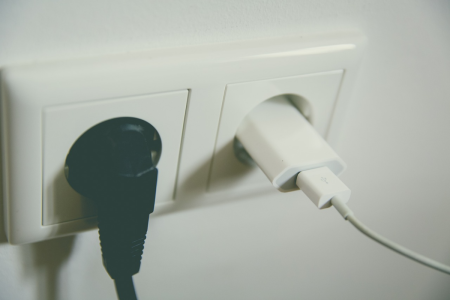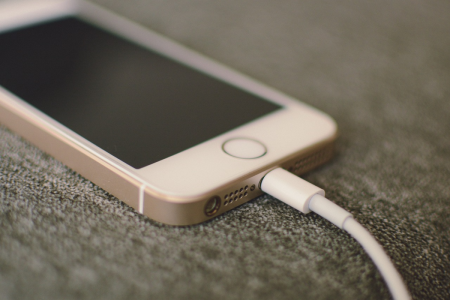The danger lurking at free charging stations – why charging your phone here may put you at risk!
Many of us like to take advantage of the free airport charging stations to keep our phones topped up while waiting for our flights. But did you know that these seemingly harmless outlets can actually put you and your personal data at risk? This might leave you wondering, 'Is there no place left to charge my phone in peace?'
Unfortunately, tech experts and even the FBI in the United States have warned against using communal charging stations found in airports, shopping centres, and hotels, as well as other public places, because of a sneaky practice called ‘juice jacking’.
I know what you're thinking: 'What on Earth is juice jacking?' It's when criminals tamper with public charging stations or even leave infected cables lying around to steal your sensitive data or upload malware onto your devices. Imagine having your credit card information, passwords, or even cherished family photos stolen just because you wanted to top up your phone battery!
Dr Mohiuddin Ahmed, a senior lecturer in computing and security at Edith Cowan University, explained that it's impossible to know if a public charging cable or station has been compromised. He cautioned: 'That charging cable might have some embedded software which can extract data from your phone or embed malicious software which will keep on spying on you.'
The last thing we need is the stress of being digitally stalked!
You might think wireless chargers are a safer option, but Dr Ahmed advises against pairing your devices with public wireless chargers too. There's still a possibility that these could be modified to cause harm.
So, how can we keep our devices and personal information safe while travelling? The best approach is to carry our own charging cables and plug them into regular electricity sockets rather than resorting to communal charging stations. You can also invest in a rechargeable power bank so that you can charge your devices on the go without needing to rely on those pesky, potentially hazardous public charging spots.
Prevention is always better than cure, and you should always keep the state of your online security updated to further reduce risks. It's crucial to know your alternatives for charging devices while travelling. One option is to bring your own charger from home and use a wall socket.
If this isn't possible, consider investing in a portable power bank. There are various types of power banks available, including those that use USB technology and others that use wireless charging technology. If your device supports wireless charging, investing in a wireless power bank can be a great way to stay safe and have a convenient way to charge your device on the go.
If you’re planning trips in the near future, why not put a few chargers in your carry-on bag just in case?
Whatever your solution, just remember it’s safer to avoid public charging stations, as your data and personal information are worth more than the convenience of a few extra battery bars. In the words of the great Australian poet, Dorothea Mackellar, 'I love a sunburnt country.' But let's keep our sunny dispositions intact by steering clear of shady charging stations.
 Seniors Discount Club members, charge your batteries but don't let your guard down when it comes to keeping your personal data safe. What are your thoughts on this story? Share your thoughts in the comments below.
Seniors Discount Club members, charge your batteries but don't let your guard down when it comes to keeping your personal data safe. What are your thoughts on this story? Share your thoughts in the comments below.
Unfortunately, tech experts and even the FBI in the United States have warned against using communal charging stations found in airports, shopping centres, and hotels, as well as other public places, because of a sneaky practice called ‘juice jacking’.
I know what you're thinking: 'What on Earth is juice jacking?' It's when criminals tamper with public charging stations or even leave infected cables lying around to steal your sensitive data or upload malware onto your devices. Imagine having your credit card information, passwords, or even cherished family photos stolen just because you wanted to top up your phone battery!
Dr Mohiuddin Ahmed, a senior lecturer in computing and security at Edith Cowan University, explained that it's impossible to know if a public charging cable or station has been compromised. He cautioned: 'That charging cable might have some embedded software which can extract data from your phone or embed malicious software which will keep on spying on you.'
The last thing we need is the stress of being digitally stalked!
You might think wireless chargers are a safer option, but Dr Ahmed advises against pairing your devices with public wireless chargers too. There's still a possibility that these could be modified to cause harm.
So, how can we keep our devices and personal information safe while travelling? The best approach is to carry our own charging cables and plug them into regular electricity sockets rather than resorting to communal charging stations. You can also invest in a rechargeable power bank so that you can charge your devices on the go without needing to rely on those pesky, potentially hazardous public charging spots.
Alternatives for Charging Devices While Travelling
Dr Ahmed mentioned that while there haven't been any recent reports of phones being compromised in Australia by using public charging stations, it's important to remain cautious.Prevention is always better than cure, and you should always keep the state of your online security updated to further reduce risks. It's crucial to know your alternatives for charging devices while travelling. One option is to bring your own charger from home and use a wall socket.
If this isn't possible, consider investing in a portable power bank. There are various types of power banks available, including those that use USB technology and others that use wireless charging technology. If your device supports wireless charging, investing in a wireless power bank can be a great way to stay safe and have a convenient way to charge your device on the go.
If you’re planning trips in the near future, why not put a few chargers in your carry-on bag just in case?
Whatever your solution, just remember it’s safer to avoid public charging stations, as your data and personal information are worth more than the convenience of a few extra battery bars. In the words of the great Australian poet, Dorothea Mackellar, 'I love a sunburnt country.' But let's keep our sunny dispositions intact by steering clear of shady charging stations.
Key Takeaways
- Australians planning to travel should avoid using public phone chargers, such as those installed at airports, due to 'juice jacking' risks.
- Tech experts warn that public chargers could have been compromised, and it's impossible to know if they have been tampered with.
- Using phone chargers in hotels and shopping centres is also risky, according to the FBI.
- 'Juice jacking' occurs when criminals tamper with public chargers to extract data or plant malicious software on users' phones.









